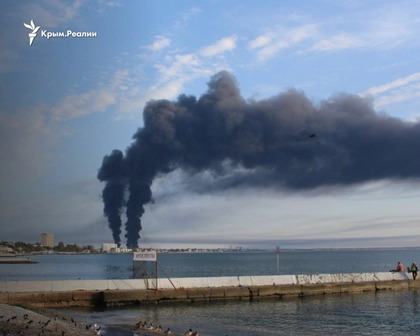Ukrainian drones attacked and set fire to a major oil refinery in Crimea on Monday, hitting the Russian-occupied region’s already hard-pressed energy infrastructure with a visibly damaging strike.
Local residents of the Black Sea resort city of Feodosia reported hearing a chain of powerful explosions and seeing pillars of flame and smoke high in the sky, in the vicinity of the JSC Marine Oil Terminal. Some reports said the blasts took place between 04:20 and 04:30 a.m.
JOIN US ON TELEGRAM
Follow our coverage of the war on the @Kyivpost_official.
Local resident social media comments said that, prior to the explosions, aircraft engine sounds were audible. Other posters claimed they heard only three powerful blasts and no aircraft sounds. Kyiv Post could not clarify the claims.
A public statement by the Kremlin-controlled occupation authority in Crimea said the situation was under control and that “something caught fire” on the oil refinery territory. There were no casualties and firefighters had the blaze fully under control, Feodosia’s occupation “Mayor” Igor Tkachenko said.


‘Fiscal Steroids Are Wearing Off’ – Biden’s Sanctions on Russia Bear Fruit Just as He Is Set to Leave
Russia’s Defense Ministry in a Monday situation report confirmed the fact of Ukrainian drone activity in skies above Crimea and claimed 12 aircraft shot down, but admitted no hits by Kyiv’s forces or damage. A Transportation Ministry statement announced a lock-down of major roads around the refinery “for technical reasons.”
Ukraine’s Army General Staff (AGS) in a statement took credit for the strike, calling it “successful” and saying fires were burning at the facility and damage was visible. Intelligence was still being collected to determine the attack’s overall effectiveness, the statement said.
Daylight saw a flood of video, photographs and ground-level accounts pouring into local information feeds, confirming that at least two fuel reservoirs were burning and billowing two massive columns of black smoke into the morning sky, in some cases visible to cameras 25 kilometers away.
Ukrainian news platforms reported that by midday two reservoirs were destroyed and burnt out, and two were still burning. Recent satellite images predating the strike show 33 reservoirs at the facility.

The JSC Marine Oil Terminal is by far the larger of two oil- and gas-processing facilities in the Crimea, a heavily militarized region packed with Russian naval, air force and ground troop bases. Since invading Ukraine, a second time in February 2022 the Kremlin has struggled to supply its forces and the civilian economy in Crimea, because the near-island is linked to the Russian mainland only by tenuous rail and sea routes that have been under Ukrainian attack for years.
Besides production, the Feodosia terminal is a key regional logistics node for the transshipment of petroleum products. According to the independent Russian news service Astra, the base has a total storage capacity of 250,000 tons.
A long-term halt to production or product transshipment at JSC Marine Oil Terminal would likely leave consumers living in Crimea and Russian military deployed there short of fuel. Ukrainian drones attacked Feodosia facility in March 2024, damaging the main fuel pumping pipeline. Following that strike retail fuel prices spiked 20 percent overnight and thousands of Crimea motorists found themselves waiting in fuel station lines of hundreds of automobiles.
Tkachenko in morning comments to the Kremlin-loyal TVCrimea24 said: “Crimea and Sevastopol are fully supplied with gasoline and diesel fuel.”

Hours before Feodosia was attacked, Ukrainian military information platforms reported drone strikes in the vicinity of two major Russian military airfields in the region, near Saki air base on Crimea’s central western coast, and Belbek airfield near the Russian navy’s former Black Sea headquarters, the port city of Sevastopol.
The Russian-run air raid warning network RosEmercom declared an air threat in effect across Crimea’s entire territory at 11 p.m. on Sunday. The drone wave hitting Saki reportedly started at about 11:30 p.m. with local residents reportedly hearing 12 to 15 explosions and seeing heavy cannon firing at something in the sky.
At Belbek airfield social media followed by local news reported Russian Air Force aircraft scrambled ahead of the incoming strike, which hit around midnight.
The Ukrainian UNIAN news agency later reported “a large fire” burning at Belbek. Local authorities announced a security lock-down around both bases. Power outages were reported across the peninsula by state electricity monopoly Krymenergo.
Less than an hour before the Feodosia facility was hit, yet another Ukrainian drone strike hit in the vicinity of the Azov Sea resort town Berdiansk, reportedly in two seaside regions.
In past drone attacks against priority targets, the Ukrainian military has at times also aimed at Russian air defenses along the planned flight path of the kamikaze drones, with the objective of breaking a gap in the Kremlin’s air defense network for the Ukrainian strike aircraft to fly through.
Both Saki and Belbek are confirmed sites of densely deployed Russian anti-aircraft missile and gun units. Located approximately halfway between Feodosia and probable Ukrainian launch site, Berdiansk is another possible site for north-facing Russian air defense systems.
The pro-Ukraine military information channel Krymsky Viter on Monday published an image of the remains of an advanced Russian S-300 anti-aircraft launcher geolocated to a site adjacent to the Feodosia refinery, but it was undated. Kyiv Post was not able to determine the actual objective of the Ukrainian attacks against Saki, Belbek and Berdiansk that preceded the Feodosia strike.
Ukraine in late summer kicked off a bombardment campaign targeting Russian oil and gas infrastructure, at times targeting facilities 700 kilometers deep inside Russia. Ukraine’s biggest ever for the war drone strike – against any target – took place on Sept. 1.
You can also highlight the text and press Ctrl + Enter










